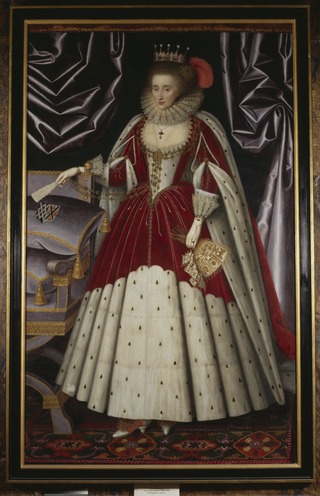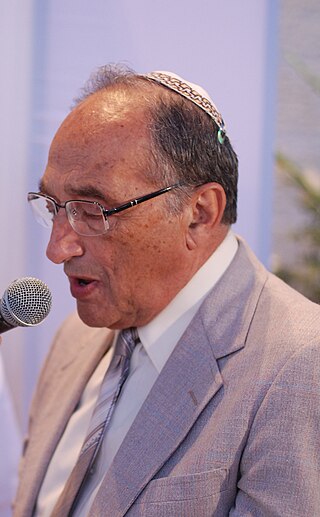
Benjamin Jonson was an English playwright and poet. Jonson's artistry exerted a lasting influence on English poetry and stage comedy. He popularised the comedy of humours; he is best known for the satirical plays Every Man in His Humour (1598), Volpone, or The Fox, The Alchemist (1610) and Bartholomew Fair (1614) and for his lyric and epigrammatic poetry. He is regarded as "the second most important English dramatist, after William Shakespeare, during the reign of James I."

The masque was a form of festive courtly entertainment that flourished in 16th- and early 17th-century Europe, though it was developed earlier in Italy, in forms including the intermedio. A masque involved music, dancing, singing and acting, within an elaborate stage design, in which the architectural framing and costumes might be designed by a renowned architect, to present a deferential allegory flattering to the patron. Professional actors and musicians were hired for the speaking and singing parts. Masquers who did not speak or sing were often courtiers: the English queen Anne of Denmark frequently danced with her ladies in masques between 1603 and 1611, and Henry VIII and Charles I of England performed in the masques at their courts. In the tradition of masque, Louis XIV of France danced in ballets at Versailles with music by Jean-Baptiste Lully.
This article contains information about the literary events and publications of 1638.
This article is a summary of the literary events and publications of 1631.
This article contains information about the literary events and publications of 1608.

The term Metaphysical poets was coined by the critic Samuel Johnson to describe a loose group of 17th-century English poets whose work was characterised by the inventive use of conceits, and by a greater emphasis on the spoken rather than lyrical quality of their verse. These poets were not formally affiliated and few were highly regarded until 20th century attention established their importance.

The New Oxford Book of English Verse 1250–1950 is a poetry anthology edited by Helen Gardner, and published in New York and London in 1972 by Clarendon Press. It was intended as a replacement for the older Quiller-Couch Oxford Book of English Verse. Selections were largely restricted to British and Irish poets.
Several anthologies of religious poetry have been published by Oxford University Press.

Lady Mary Wroth was an English noblewoman and a poet of the English Renaissance. A member of a distinguished literary family, Lady Wroth was among the first female English writers to have achieved an enduring reputation. Mary Wroth was niece to Mary Herbert née Sidney, and to Sir Philip Sidney, a famous Elizabethan poet-courtier.

John Carey, is a British literary critic, and post-retirement (2002) emeritus Merton Professor of English Literature at the University of Oxford. He is known for his anti-elitist views on high culture, as expounded in several books. He has twice chaired the Booker Prize committee, in 1982 and 2003, and chaired the judging panel for the first Man Booker International Prize in 2005.

The Masque of Blackness was an early Jacobean era masque, first performed at the Stuart Court in the Banqueting Hall of Whitehall Palace on Twelfth Night, 6 January 1605. It was written by Ben Jonson at the request of Anne of Denmark, the queen consort of King James I, who wished the masquers to be disguised as Africans. Anne was one of the performers in the masque along with her court ladies, all of whom appeared in blackface makeup. In a ceremony earlier on the day, Prince Charles, Anne's second son was given the title of Duke of York.
Jonathan Goldberg was an American literary theorist who was the Sir William Osler Professor of English Literature at Johns Hopkins University, and Arts and Sciences Distinguished Professor Emeritus of English at Emory University where he directed Studies in Sexualities from 2008 to 2012. His work frequently deals with the connections between early modern literature and modern thought, particularly in issues of gender, sexuality, and materiality. He received his BA, MA, and PhD from Columbia University.

Lucy Russell, Countess of Bedford was a major aristocratic patron of the arts and literature in the Elizabethan and Jacobean eras, the primary non-royal performer in contemporary court masques, a letter-writer, and a poet. She was an adventurer (shareholder) in the Somers Isles Company, investing in Bermuda, where Harrington Sound is named after her.
Debora Kuller Shuger is a literary historian and scholar. She studies early modern, Renaissance, late 16th- and 17th century England. She writes about Tudor-Stuart literature; religious, political, and legal thought; Neo-Latin; and censorship of that period.
Nicholas Hill was an English natural philosopher, considered a disciple of Giordano Bruno. He is known for his 1601 book Philosophia epicurea.
Claude J. Summers is an American literary scholar, and the William E. Stirton Professor Emeritus in the Humanities and Professor Emeritus of English at the University of Michigan-Dearborn. A native of Galvez, Louisiana, he was the third child of Burg Martin Summers and Theo Coy Causey. He was educated in the public schools of Ascension Parish, graduating from Gonzales High School in 1962. He has long credited two teachers at Gonzales High School—Diana Sevario Welch and Sherry Rushing—for inspiring his interest in academic achievement.

Murray (Meir) Roston is an Israeli Emeritus professor of English Literature at Bar-Ilan University.
Annabel M. Patterson is the Sterling Professor Emeritus of English at Yale University.
Charles Raymond Larson was an American scholar of literature, particularly of African literature. He published a number of anthologies of African literature, as well as literary criticism, and is seen as one of the founders of the study of African literature in the United States.








